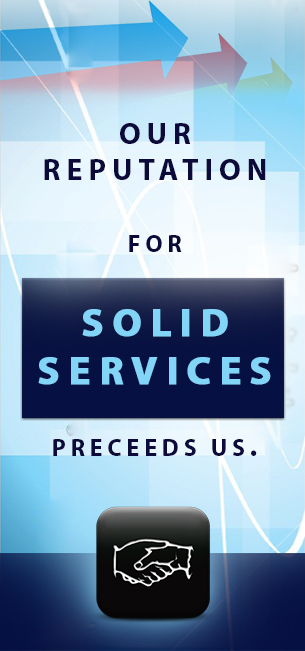Accounting Philosophy
——————-
We believe that accounting is an art which should not be placed in a straight jacket of uniformity; that professional judgement is always an important ingredient and that varying conditions may require varying accounting methods. It follows that we believe each client has the right and responsibility to select, from those that are recognized as acceptable, the accounting methods and procedures which it deems most appropriate. This freedom of choice, is however, constrained by conventions arising out of business practice and by professional and governmental pronouncements, rules and regulations.
We believe our responsibilities in this area to be two fold; to determine that the principles followed are within the guidelines of generally accepted accounting principles and applicable pronouncement of regulatory authorities and most importantly, to provide advise and counsel to management as it decides upon the most appropriate and advantageous methods, having in mind both the immediate and long-range effect of the decisions.
The Companies and Allied Matters Act 1990 merely lays minimum reporting standard and disclosures. The Institute of Chartered Accountants of Nigeria requires adherence to the statements issued by the International Accounting Standards Committee and the Nigerian Accounting Standards Board. In pursuit of our firm’s basic accounting philosophy and the awareness of the increasing complexity in the application of best accounting practice, our firm defines best practice as those generally acceptable in the United States of America and the United Kingdom. Therefore, we believe it is essential to keep officials of our clients informed of current thinking on accounting principles, particularly as they relate to their circumstances.
Auditor’s Responsibility
———————
According to the Companies and Allied Matters Act 1990, it is the responsibility of the management to maintain proper books of account and to prepare accounts annually that show a true and fair view of the company’s state of affairs at the balance sheet date and the results of operations for the period ended on that date.
It is also management’s responsibility to establish the whole system of controls, financial and otherwise, in order to carry on the business of the company in an orderly manner, safeguard its assets and secure as far as possible the accuracy and reliability of its records.
The auditor’s main responsibility is to make a report to the members of the company on the accounts prepared by the directors but examined by them, as to whether the accounts show a true and fair view of the company’s state of affairs and results of operation for the financial year and whether such accounts were prepared in accordance with the provisions of the Companies and Allied Matters Act 1990.
Communications and Reporting.
Communications with clients regarding our annual audit begin with a review of our audit plan with company officials and continue as our examination progresses. Upon completion of each phase of the examination, discussions are held with appropriate company personnel on matters which pertain to financial reporting, income tax points, and management oriented operational matters. It is also our practice to prepare formal memoranda regarding our major constructive recommendations for our clients.
Audit Philosophy
——————–
Our firm’s policy is that a uniform audit policy approach be applied on all audit engagements. Our audit approach requires the auditors to study the client’s system of internal control and to evaluate it in order to identify the features that are important to the audit. This evaluation enables the auditors to take this into account in deciding his programme of audit tests. The extent to which the auditor chooses to rely on the operation of internal controls will also be governed by the relative efficiency of performing compliance tests as opposed to extending substantive procedures.
Main Elements of our Audit Approach.
Our audit approach is directed to the expression of an opinion on the accounts and is summarized below. The auditor should:
(a). Plan the audit engagement. This is the single most important element of our audit approach which affects efficiency in the performance and the overall success of an audit engagement.
(b). Obtain knowledge of and record the client’s accounting system, including the procedures and controls incorporated in it, and review selected transactions to determine that he has understood and recorded the system properly.
(c). Select and complete the appropriate Internal Control Questionnaire.
(d). Evaluate the system to identify:
i). Those internal accounting controls he proposed to rely upon.
ii). Any apparent weaknesses in the system.
(e). Discuss with the client the apparent weakness identified in order to ascertain whether they are compensated or mitigated by some other controls, if they are not, the auditor should assess their possible effects on the accounts and on the nature, timing and extent of his audit tests.
(f). Design (or modify) and carry our programme of compliance tests to determine whether the controls on which he intends to place reliance were operating during the period under review.
(g). Report apparent weaknesses and break-down in internal control to the client in a management letter which should contain constructive suggestions on how to overcome the weaknesses.
(h). Based on the results of the work described in (b) to (f) above, design (or modify) and carry out a programme of audit work to substantiate the amounts appearing in the statutory accounts and related notes – i.e. substantive tests.


